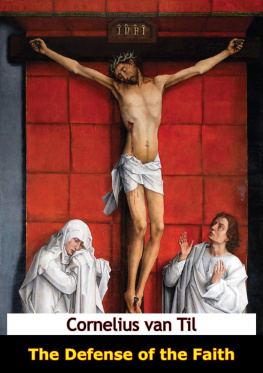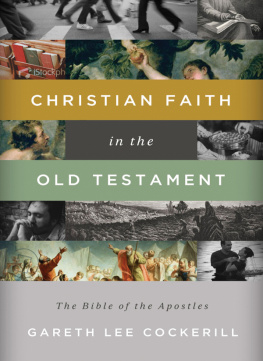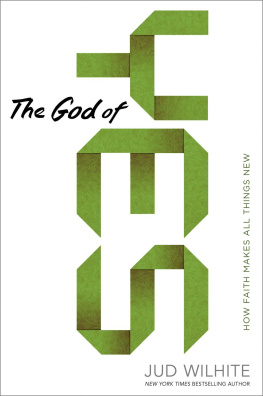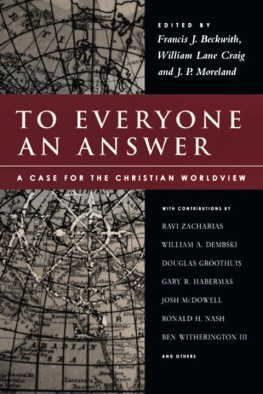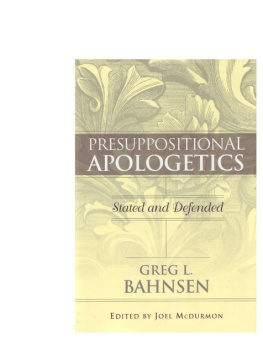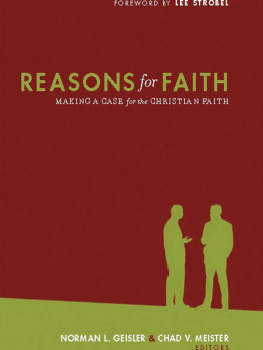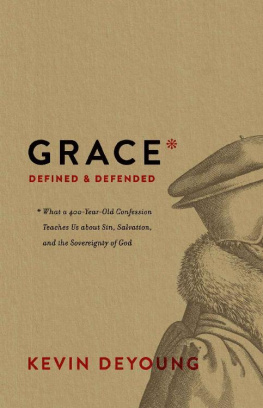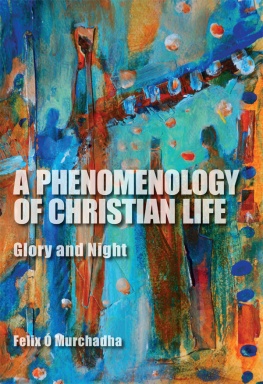Cornelius van Til - The Defense of the Faith
Here you can read online Cornelius van Til - The Defense of the Faith full text of the book (entire story) in english for free. Download pdf and epub, get meaning, cover and reviews about this ebook. year: 2020, publisher: Barakaldo Books, genre: Religion. Description of the work, (preface) as well as reviews are available. Best literature library LitArk.com created for fans of good reading and offers a wide selection of genres:
Romance novel
Science fiction
Adventure
Detective
Science
History
Home and family
Prose
Art
Politics
Computer
Non-fiction
Religion
Business
Children
Humor
Choose a favorite category and find really read worthwhile books. Enjoy immersion in the world of imagination, feel the emotions of the characters or learn something new for yourself, make an fascinating discovery.
- Book:The Defense of the Faith
- Author:
- Publisher:Barakaldo Books
- Genre:
- Year:2020
- Rating:3 / 5
- Favourites:Add to favourites
- Your mark:
- 60
- 1
- 2
- 3
- 4
- 5
The Defense of the Faith: summary, description and annotation
We offer to read an annotation, description, summary or preface (depends on what the author of the book "The Defense of the Faith" wrote himself). If you haven't found the necessary information about the book — write in the comments, we will try to find it.
The Defense of the Faith — read online for free the complete book (whole text) full work
Below is the text of the book, divided by pages. System saving the place of the last page read, allows you to conveniently read the book "The Defense of the Faith" online for free, without having to search again every time where you left off. Put a bookmark, and you can go to the page where you finished reading at any time.
Font size:
Interval:
Bookmark:


Barakaldo Books 2020, all rights reserved. No part of this publication may be reproduced, stored in a retrieval system or transmitted by any means, electrical, mechanical or otherwise without the written permission of the copyright holder.
Publishers Note
Although in most cases we have retained the Authors original spelling and grammar to authentically reproduce the work of the Author and the original intent of such material, some additional notes and clarifications have been added for the modern readers benefit.
We have also made every effort to include all maps and illustrations of the original edition the limitations of formatting do not allow of including larger maps, we will upload as many of these maps as possible.
THE DEFENSE OF THE FAITH
BY
CORNELIUS VAN TIL
Contents
TO MY WIFE
The present writer has from time to time prepared syllabi for his classes in Christian Apologetics. A number of outsiders have taken an interest in these syllabi. Some have used them for classroom teaching; others have subjected them to critical analysis.
The present volume seeks to be of service to both types of readers. In the first place it seeks to set forth in positive fashion what seems to the writer to be the Biblical method of defending the Christian Faith. This necessitates making a comparison between the Romanist-Evangelical and the Reformed points of view concerning apologetics. In the second place this work deals with contemporary objections which have been made against the writers views of apologetics.
While therefore this book is, in a sense, an answer to critics, that is not its primary purpose. Its primary purpose is to set forth, in broad outline, a method of defending Christianity which is consistent with the nature of Christianity.
Acknowledgment is hereby made to publishers who kindly gave permission to quote from various books: To the Macmillan Company for permission to quote from Religious Realism, copyright, 1931, and from A. E. Taylors Does God Exist? copyright-reprint 1947; to the Cambridge University Press for permission to quote from James Jeans The Mysterious Universe ; to William B. Eerdmans Co. for permission to quote from James Daanes A Theology of Grace and from Edward Carnells An Introduction to Christian Apologetics and from William Masselinks General Revelation and Common Grace ; to F. S. Crofts and Company for permission to quote from Martin, Clarke, Clark, Ruddick: A History of Philosophy ; to Yale University Press for permission to quote from Cassirers Essay on Man, and Gilsons God and Philosophy ; to Charles Scribners Sons for permission to quote from Millikans Science and the New Civilization ; and to the estate of Felix Cohen for permission to quote from Morris R. Cohens Reason and Nature, copyrighted, revised 1953.
Special thanks are due to the Rev. Rousas John Rushdoony for carefully reading the entire manuscript; and to my former student, Robert G. DeMoss, Th.M., for painstaking help in the technical details of the manuscript, and for the Indexes.
A brief survey of the criticism to which my views in theology and apologetics have been subjected will first be given to enable the reader to see the points at issue.
The present writer and his critics are all adherents of orthodox Christianity. More than that, they have expressed allegiance to the Reformed Faith as set forth in its historic creeds. The historic Reformed Faith is distinguished from Roman Catholicism; within the Protestant fold it is distinguished from Arminianism; in the current theological situation it is distinguished from dialectical theology. The critics may therefore be expected to use the Scripture, taken to be the infallible rule of faith and practice, as their ultimate criterion and the historic Reformed Confessions as their secondary criterion in their evaluation of my thinking.
In addition to the Scriptures and the Confessions, there are the writings of great Reformed theologians. There are first, the works of John Calvin, then the works of the three great men of recent Reformed theology, Abraham Kuyper, Herman Bavinck and Benjamin Breckinridge Warfield. All Reformed men hold these theologians in high esteem, and to differ from them is a serious matter. Other men of great stature, too, have written in exposition and defense of the Reformed Faith, but the writings of none have confessional standing. But to depart from them may, in a general sense, be conducive to a presumption that one has departed also from the creeds of the church. These men have the status of authorities in the field of Reformed thinking and represent the tradition of Reformed thought; they are the classical representatives of the Reformed Faith.
Now the charges against me are that I have not only departed from the classical tradition of Reformed thinking, but that I have departed from the creeds and even from the idea of the Bible as the infallible standard of faith and practice.
Before taking up these charges in detail, it is well to look at the specific and basic objections raised in each instance.
a. Masselink
Masselinks main objection appears to be well expressed in the following words: Our great difficulty with Van Tils philosophy of common grace is his premise or starting point, namely, the absolute ethical antithesis.
b. The Calvin Forum Articles
The Forum articles cannot readily be reduced to one main point. Yet one emphasis recurs repeatedly. It is to the effect that I have largely borrowed my epistemology from the idealist school of philosophy.
1. Cecil De Boer . In asserting that the givens with which we must begin are not facts but God-interpreted facts, the new apologetic seems to have taken over uncritically the idealist theory of knowledge and truth, a theory leading logically to a kind of pantheism.
2. Jesse De Boer . In common with the majority of post-Renaissance philosophers Van Til is exercised by the problem of knowledge. I do not wish to discuss such a general topic as the symptoms in Van Til of kinship with modern epistemologists. Instead, I want to point out specifically how he uses terms and arguments borrowed from speculative idealism, and thereby to underline my view that he is skating on thin ice; his purism is turning into a boomerang. For modern idealism is no friend of Christianity.
I suggest that Van Tils apologetics, because it does not grow out of painstaking and complete mastery of great Christian texts, ancient, medieval, and modern, is twisted and victimized by the categories and techniques of the idealists whose works he read in his student days.
3. Orlebeke . Less outspoken than the others, Orlebeke is also concerned to discover how my thought may be distinguished from that of idealism. He quotes the following words of mine: For Christianity, Gods thoughts are constitutive . By Gods thoughts do the facts of the universe come into existence. Then he asks: Are we to understand that the knowledge of God cannot be distinguished from the objects of that knowledge? If it is possible to say that Gods thought is constitutive of facts, is it not also necessary to say that the facts are constitutive of Gods knowledge, and therefore of God? In order to maintain a sharp distinction between God and his creation it would seem to be necessary to make a sharp distinction between the being of created reality, and Gods knowledge of it.
Next pageFont size:
Interval:
Bookmark:
Similar books «The Defense of the Faith»
Look at similar books to The Defense of the Faith. We have selected literature similar in name and meaning in the hope of providing readers with more options to find new, interesting, not yet read works.
Discussion, reviews of the book The Defense of the Faith and just readers' own opinions. Leave your comments, write what you think about the work, its meaning or the main characters. Specify what exactly you liked and what you didn't like, and why you think so.

